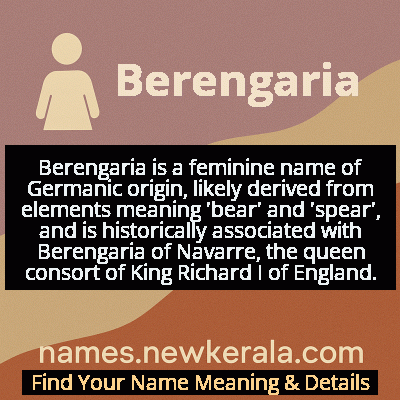Berengaria Name Meaning & Details
Origin, Popularity, Numerology Analysis & Name Meaning of Berengaria
Discover the origin, meaning, and cultural significance of the name BERENGARIA. Delve into its historical roots and explore the lasting impact it has had on communities and traditions.
Name
Berengaria
Gender
Female
Origin
Christian
Lucky Number
8
Meaning of the Name - Berengaria
Berengaria is a feminine name of Germanic origin, likely derived from elements meaning 'bear' and 'spear', and is historically associated with Berengaria of Navarre, the queen consort of King Richard I of England.
Berengaria - Complete Numerology Analysis
Your Numerology Number
Based on Pythagorean Numerology System
Ruling Planet
Saturn
Positive Nature
Ambitious, efficient, realistic, and authoritative.
Negative Traits
Materialistic, stressed, confrontational, and can be overly ambitious.
Lucky Colours
Dark blue, black.
Lucky Days
Saturday.
Lucky Stones
Blue sapphire, amethyst.
Harmony Numbers
2, 4, 6.
Best Suited Professions
Business leaders, managers, financial services, law enforcement.
What People Like About You
Leadership, determination, organizational skills.
Famous People Named Berengaria
Berengaria of Navarre
Queen of England
Married Richard the Lionheart and was the only English queen never to set foot in England
Berengaria of Castile
Queen Regnant
Ruled as sovereign Queen of Castile and played key role in Iberian politics
Berengaria of Barcelona
Queen Consort
Mother of two kings and influential figure in 12th century Spanish politics
Berengaria of Portugal
Queen Consort of Denmark
Known for her religious devotion and diplomatic influence in Scandinavian courts
Name Variations & International Equivalents
Click on blue names to explore their detailed meanings. Gray names with will be available soon.
Cultural & Historical Significance
In Iberian history, the name gained particular significance through Berengaria of Castile, who ruled as queen regnant at a time when female sovereignty was rare. Her reign demonstrated that women could exercise political power effectively, challenging gender norms of the period. The name's continued use among Spanish and Portuguese nobility throughout the Middle Ages established it as a symbol of legitimate royal lineage and female authority. This historical legacy gives Berengaria cultural weight beyond its linguistic meaning, connecting it to specific moments in European history when women exercised significant political influence.
Extended Personality Analysis
The name Berengaria evokes personality traits that reflect its royal heritage and powerful meaning. Individuals with this name are often perceived as possessing natural authority and dignity, combined with a strong protective instinct toward family and community. They tend to be strategic thinkers who approach challenges with careful planning and determination, much like the medieval queens who navigated complex political landscapes. The 'bear' element of the name suggests warmth and loyalty in personal relationships, while the 'spear' component indicates directness and the ability to take decisive action when necessary.
Berengarias are typically seen as bridge-builders who can mediate between different perspectives, a trait that may stem from the name's historical association with diplomatic marriages between royal houses. They often display resilience in adversity and maintain composure under pressure, qualities that served their namesake queens well in turbulent political environments. While they may appear reserved initially, Berengarias usually reveal deep loyalty and commitment to those who earn their trust. The historical weight of the name often inspires a sense of responsibility and high personal standards, driving them to achieve excellence in their chosen fields while maintaining integrity and traditional values.
Modern Usage & Popularity
In contemporary naming practices, Berengaria remains an exceptionally rare choice, typically selected by parents with a strong interest in history, medieval studies, or unique classical names. Its usage has never entered mainstream popularity charts in any English-speaking country, maintaining its status as a distinctive historical name. However, it experiences occasional minor revivals coinciding with popular media featuring medieval themes or increased public interest in historical female figures. Modern parents who choose Berengaria often appreciate its strong feminine qualities, royal connections, and the opportunity to give their daughter a truly unique name with deep historical roots. The name's complexity and unfamiliarity to most people mean that modern Berengarias often develop skills in patiently explaining their name's pronunciation and background. While challenging in everyday use, this distinctiveness often becomes a point of pride and personal identity for those who bear the name in the 21st century.
Symbolic & Spiritual Meanings
Symbolically, Berengaria represents a powerful synthesis of protective strength and noble purpose. The bear element symbolizes primal strength, maternal protection, and connection to nature's raw power, while the spear represents focused intention, defense, and the ability to cut through obstacles. This combination creates a rich symbolic narrative of someone who protects what they value while actively pursuing their goals. The name also carries the metaphorical weight of historical continuity, linking modern bearers to a lineage of influential women who shaped European history.
Beyond its literal meaning, Berengaria symbolizes the balance between tradition and innovation—much like the medieval queens who bore the name navigated established customs while exercising personal agency. It represents the idea that true strength combines physical courage with intellectual strategy, and that leadership requires both the protective instinct of the bear and the precise direction of the spear. In a broader sense, the name embodies the concept of feminine power that is both nurturing and authoritative, reflecting the complex roles that women have historically played as both caretakers and decision-makers. This symbolic richness makes Berengaria not just a name, but a narrative about strength, heritage, and purposeful action.

